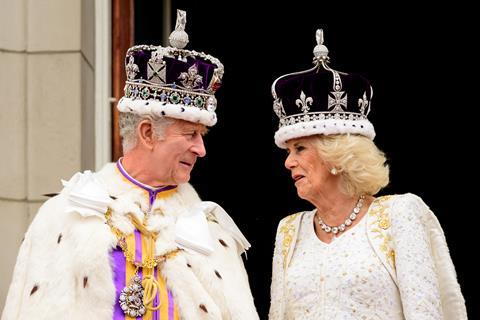Once described as “the most hated woman in Britain”, Camilla Rosemary Shand is now Queen. Chris Goswami argues that there is much Christians can learn from her quiet resolve to turn the other cheek

It’s hard to think of many people in the public eye who have endured as much criticism and disdain over the years as the new Queen Camilla.
Following the death of Diana, Princess of Wales in 1997, Camilla was famously dubbed “the most hated woman in Britain” by the press. Much more recently, her stepson, Prince Harry, used his memoir, Spare (Random House), to accuse her of leaking private stories to reporters.
But in every case, her response has been simply not to respond. She chooses to not say anything.
Turn the other cheek
When Princess Diana infamously told Martin Bashir that “there were three of us in the marriage”, it made Camilla an easy target for the press. With no royal protection squad, she endured years of reporters besieging her house night and day.
That BBC interview sealed Camilla’s reputation as a villain and a marriage wrecker. We now know the truth was much more complicated: Charles and Diana’s marriage was probably headed for disaster the moment Charles was refused permission to marry the woman he loved. Of course, Camilla must bear responsibility for the part she played, as must both Charles and Diana for their infidelities.
Jesus instruction to turn the other cheek is a command to not respond in kind, but find another way
But since that time, what is remarkable is the way Camilla has redeemed her reputation. Both in the past, and more recently, she could have made counter-accusations, fallen into self-pity or lashed out at those who branded her “the other woman”. But she has consistently chosen not to.
Today she is becoming more and more known - and respected - for her charitable works, including empowering women who have suffered sexual or domestic abuse and, in particular, her efforts to increase literacy among children in the UK. Her attitude to all she has been through has been summarised by her friends as: “don’t make a thing of it - it will settle down”.
This is arguably quite different to the approach of the Duke and Duchess of Sussex. They say they wish to retain their privacy while, at the same time, make headline-grabbing accusations about their family. None of us will ever know the truth of what went on behind closed doors, but Camilla’s response – along with the late Queen Elizabeth, King Charles and Prince William - is a powerful illustration of turning the other cheek.
Jesus often made paradoxical comments that surprised both his listeners and those who read his words today. They make us think harder than if he stated a plain truth.
In Matthew 5:38-42, he makes an extraordinary statement: “You have heard that it was said, ‘Eye for eye, and tooth for tooth.’ But I tell you, do not resist an evil person. If anyone slaps you on the right cheek, turn to them the other cheek also. And if anyone wants to sue you and take your shirt, hand over your coat as well. If anyone forces you to go one mile, go with them two miles.”
On the face of it, this sounds like an instruction to become a doormat and let people routinely take advantage of you. But that misses out on the core of Jesus’ teaching - which arises from the nuances of his culture.
In Jesus’ day, a Roman solider could legally demand that a citizen carry his backpack for one mile –and you had to comply. But the limit of the law meant you could be forced to take it no further. Imagine, then, the soldier’s confusion if a citizen insisted on carrying his pack for two miles! It breaks protocol; it turns the tables.
Turning the cheek takes resolve. It’s so easy to do the opposite in a world where the knee-jerk response is normal
Similarly, causing someone who owed you money to appear naked, by taking their coat and their shirt (most likely all they had), was taboo. There were laws to protect the poor from losing everything they had. If you caused any kind of nakedness you were regarded as the aggressor. It exposed the injustice of the situation for all to see.
So, Jesus instruction to turn the other cheek is not a call to weakness; to do nothing. It’s a command to not respond in kind, but find another way. Not flight, not fight, but a third way. Throughout history, this third way has been proven. Gandhi, in formulating his militant campaign of non-violent resistance against British rule in India, quoted these same words of Jesus.
Paul echoes this counter-cultural idea in Romans 12:17, when he tells Christians not to “repay anyone evil for evil” but overcome evil with good. “In doing this, you will heap burning coals on his head” says Paul (v20).
Done well, turning the other cheek is a powerful response.
A potent response
Camilla has certainly made mistakes in the past - as we all have. And we don’t know what our new Queen believes when it comes to faith. She may be a Catholic, according to some sources.
According to our gospel, none of us are defined by our mistakes. It’s what we do afterwards that counts. And, over the years she, along with other members of the royal family, have demonstrated that the best response to an attack on your character is to say nothing.
Turning the cheek takes strength and resolve. It’s so easy to do the opposite, especially in a world where the instant, knee-jerk response is normal.
Perhaps Camilla will never be the Queen of Hearts that people imagined Diana would be. But through her hard work and refusal to hit back, she has gained respect and admiration from many. She has shown there is strength in restraint, and power in silence.
It is also a reminder for us. Sometimes, the most potent - and Christ-like - response we can make is to not respond at all.






































No comments yet